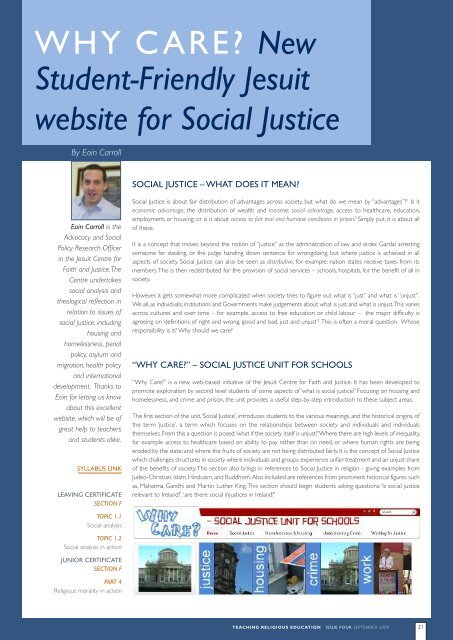TeachingRE Issue 4.pdf - the Second Level Support Service
TeachingRE Issue 4.pdf - the Second Level Support Service
TeachingRE Issue 4.pdf - the Second Level Support Service
You also want an ePaper? Increase the reach of your titles
YUMPU automatically turns print PDFs into web optimized ePapers that Google loves.
WHY CARE? NewStudent-Friendly Jesuitwebsite for Social JusticeBy Eoin CarrollSOCIAL JUSTICE – WHAT DOES IT MEAN?Eoin Carroll is <strong>the</strong>Advocacy and SocialPolicy Research Officerin <strong>the</strong> Jesuit Centre forFaith and Justice.TheCentre undertakessocial analysis and<strong>the</strong>ological reflection inrelation to issues ofsocial justice, includinghousing andhomelessness, penalpolicy, asylum andmigration, health policyand internationaldevelopment. Thanks toEoin for letting us knowabout this excellentwebsite, which will be ofgreat help to teachersand students alike.SYLLABUS LINKLEAVING CERTIFICATESECTION FSocial Justice is about fair distribution of advantages across society, but what do we mean by “advantages”? 1 Is iteconomic advantage, <strong>the</strong> distribution of wealth and income; social advantage, access to healthcare, education,employment, or housing; or is it about access to fair trial and humane conditions in prison? Simply put, it is about allof <strong>the</strong>se.It is a concept that moves beyond <strong>the</strong> notion of “justice” as <strong>the</strong> administration of law and order, Gardaí arrestingsomeone for stealing, or <strong>the</strong> judge handing down sentence for wrongdoing, but where justice is achieved in allaspects of society. Social Justice can also be seen as distributive, for example: nation states receive taxes from itsmembers.This is <strong>the</strong>n redistributed for <strong>the</strong> provision of social services – schools, hospitals, for <strong>the</strong> benefit of all insociety.However, it gets somewhat more complicated when society tries to figure out what is “just” and what is “unjust”.We all, as individuals, institutions and Governments make judgements about what is just and what is unjust.This variesacross cultures and over time – for example, access to free education or child labour – <strong>the</strong> major difficulty isagreeing on ‘definitions of right and wrong, good and bad, just and unjust’ 2 .This is often a moral question. Whoseresponsibility is it? Why should we care?“WHY CARE?” – SOCIAL JUSTICE UNIT FOR SCHOOLS“Why Care?” is a new web-based initiative of <strong>the</strong> Jesuit Centre for Faith and Justice. It has been developed topromote exploration by second level students of some aspects of ‘what is social justice?’ Focusing on housing andhomelessness, and crime and prison, <strong>the</strong> unit provides a useful step-by-step introduction to <strong>the</strong>se subject areas.The first section of <strong>the</strong> unit,‘Social Justice’, introduces students to <strong>the</strong> various meanings, and <strong>the</strong> historical origins, of<strong>the</strong> term ‘justice’, a term which focuses on <strong>the</strong> relationships between society and individuals and individuals<strong>the</strong>mselves. From this a question is posed:‘what if <strong>the</strong> society itself is unjust?’Where <strong>the</strong>re are high levels of inequality,for example access to healthcare based on ability to pay ra<strong>the</strong>r than on need, or where human rights are beingeroded by <strong>the</strong> state; and where <strong>the</strong> fruits of society are not being distributed fairly. It is <strong>the</strong> concept of Social Justicewhich challenges structures in society where individuals and groups experience unfair treatment and an unjust shareof <strong>the</strong> benefits of society.This section also brings in references to Social Justice in religion - giving examples fromJudeo-Christian, Islam, Hinduism, and Buddhism.Also included are references from prominent historical figures suchas, Mahatma Gandhi and Martin Lu<strong>the</strong>r King.This section should begin students asking questions: ‘Is social justicerelevant to Ireland?’,‘are <strong>the</strong>re social injustices in Ireland?’TOPIC 1.1Social analysisTOPIC 1.2Social analysis in actionJUNIOR CERTIFICATESECTION FPART 4Religious morality in actionTEACHING RELIGIOUS EDUCATION ISSUE FOUR SEPTEMBER 200921


